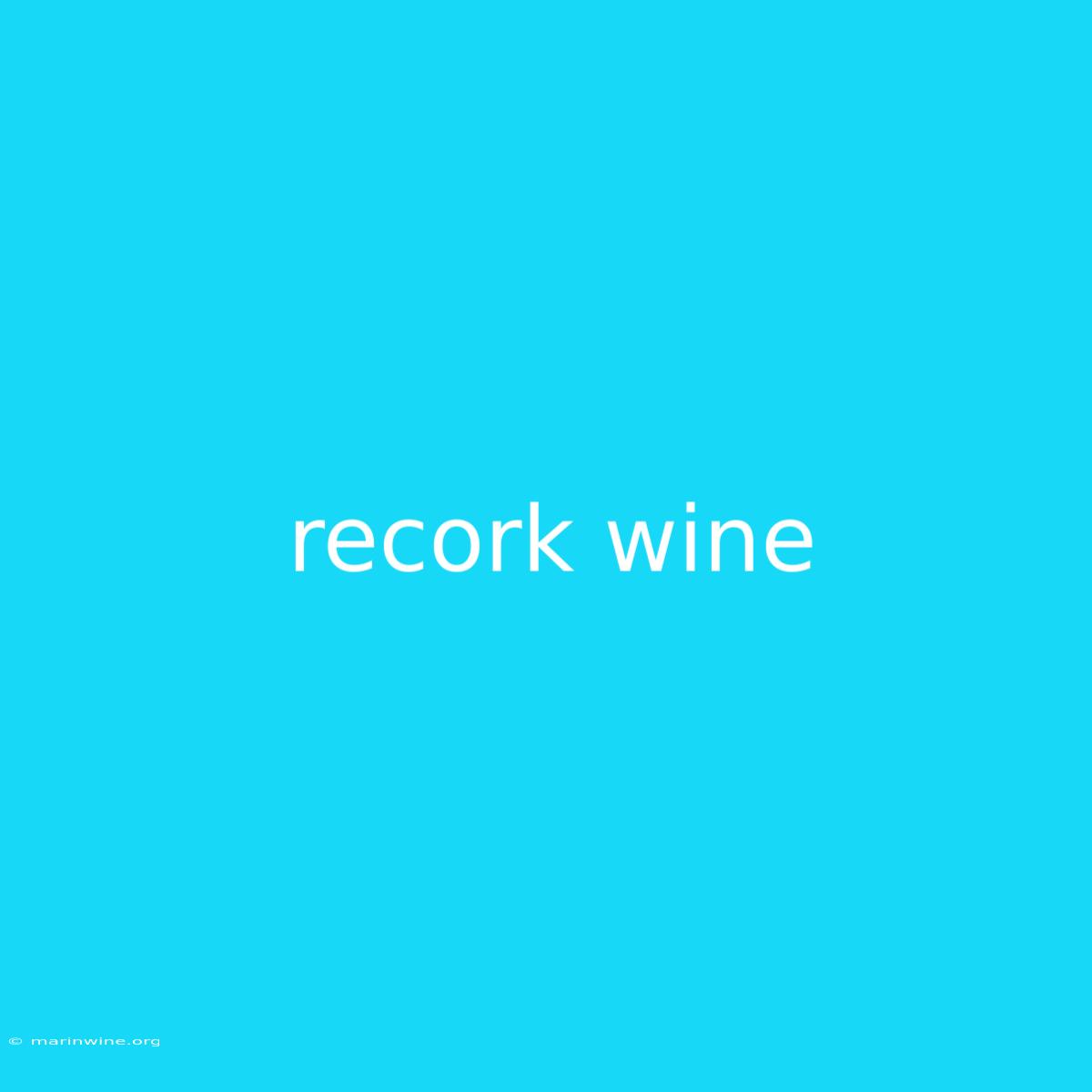Recorking Wine: Can You Really Do It?
Have you ever opened a bottle of wine, only to realize you can't finish it? You're not alone. Many wine enthusiasts face the dilemma of how to preserve their unfinished bottle. But can you really recork wine and expect it to retain its quality? The short answer is: it's not ideal, but it's better than leaving it open to the air.
Why It Matters
Recorking wine is a crucial topic for anyone who enjoys wine but doesn't always finish a bottle in one sitting. Understanding the process and its implications helps you make informed decisions about how to store and enjoy your wine. This article delves into the factors affecting wine quality after opening, the best practices for recorking, and the potential risks involved.
Key Takeaways of Recorking Wine
| Factor | Impact |
|---|---|
| Exposure to Air | Oxidation, leading to flavor changes and loss of aroma |
| Recorking Method | Affects the seal's effectiveness in preventing oxidation |
| Wine Type | Some wines are more susceptible to oxidation than others |
| Storage Conditions | Temperature and light can accelerate oxidation |
Recorking Wine: A Closer Look
Introduction
Recorking wine is a common practice used to preserve opened bottles. However, it's essential to understand that it's not a perfect solution. Wine, once exposed to air, undergoes a chemical process called oxidation, which affects its taste and aroma.
Key Aspects of Recorking
- Oxidation: When wine comes into contact with air, it oxidizes, causing changes in its flavor profile. This process accelerates with exposure to light and heat.
- Recorking Methods: There are several recorking methods, each with its own level of effectiveness. Traditional corks are porous and can't provide a perfect seal. Vacuum stoppers are more effective but can still allow some air to seep through.
- Wine Type: Some wines, particularly lighter reds and whites, are more susceptible to oxidation than others. Fortified wines and sparkling wines tend to hold up better.
- Storage Conditions: Storing recorked wine in a cool, dark place can help slow down oxidation.
Oxidation
Oxidation is a complex chemical process that involves the reaction of wine with oxygen. This reaction causes the wine to lose its vibrant fruit flavors and develop a dull, "cooked" character. The process can also lead to the formation of acetic acid, resulting in a vinegar-like taste.
Recorking Methods
- Traditional Corks: These are porous and can't provide a perfect seal.
- Vacuum Stoppers: These are more effective than traditional corks at creating a vacuum, but they can still allow some air to seep through.
- Wine Preservatives: These can be added to the wine to inhibit oxidation.
Wine Type
- Red Wines: Heavier reds with tannins, such as Cabernet Sauvignon and Merlot, tend to hold up better after opening.
- White Wines: Lighter white wines, such as Sauvignon Blanc and Pinot Grigio, are more susceptible to oxidation.
- Sparkling Wines: Sparkling wines, with their high carbon dioxide content, are better able to resist oxidation.
Storage Conditions
- Temperature: Wine should be stored in a cool, dark place, preferably around 55°F (13°C).
- Light: Light can accelerate oxidation, so it's best to store recorked wine in a dark or dimly lit area.
Recorking: A Practical Guide
Recorking with a Traditional Cork
- Clean the Cork: Wipe any loose wine off the cork with a clean cloth.
- Reinsert the Cork: Carefully push the cork back into the bottle, ensuring it's seated firmly.
- Store Properly: Store the bottle in a cool, dark place.
Recorking with a Vacuum Stopper
- Clean the Stopper: Rinse the vacuum stopper with warm water.
- Insert the Stopper: Place the stopper over the bottle's opening and pump out the air until the stopper is securely attached.
- Store Properly: Store the bottle in a cool, dark place.
Tips for Recorking Wine
- Don't overfill the bottle: Leave a little space at the top to allow for expansion.
- Recork the wine as soon as possible: The sooner you recork the wine, the less it will oxidize.
- Consider using wine preservatives: These can help to slow down oxidation.
FAQ
Q: How long can I keep recorked wine?
A: The shelf life of recorked wine varies depending on the wine type, the method of recorking, and the storage conditions. However, it's generally recommended to consume recorked wine within 3-5 days.
Q: Can I freeze recorked wine?
A: Freezing wine is not recommended as it can damage the wine's structure and lead to a loss of flavor.
Q: What are the signs of oxidized wine?
A: Oxidized wine will have a dull, cooked flavor and may have a brownish hue.
Tips for Recorking Wine
- Use the right tools: Invest in a good quality vacuum stopper for optimal results.
- Store in a cool, dark place: Avoid exposing your recorked wine to direct sunlight or heat.
- Don't overfill: Leave a small space at the top to prevent pressure build-up.
- Drink it within a few days: While recorking can help preserve wine, it's best to enjoy it within 3-5 days for the best flavor.
- Consider wine preservatives: These can help to slow down oxidation and extend the shelf life of your wine.
Summary
Recorking wine can be an effective way to preserve an unfinished bottle, but it's not a perfect solution. Understanding the factors affecting oxidation and implementing proper recorking techniques can help you maximize the quality and lifespan of your recorked wine. By following the tips and advice outlined in this article, you can enjoy your favorite wines to the fullest, even after opening the bottle.
Closing Message
Wine is meant to be enjoyed. While recorking can help you savor your favorite bottles for a longer period, remember that it's best to enjoy them fresh. So, grab your glass, pour yourself a drink, and raise a toast to the art of enjoying wine!

